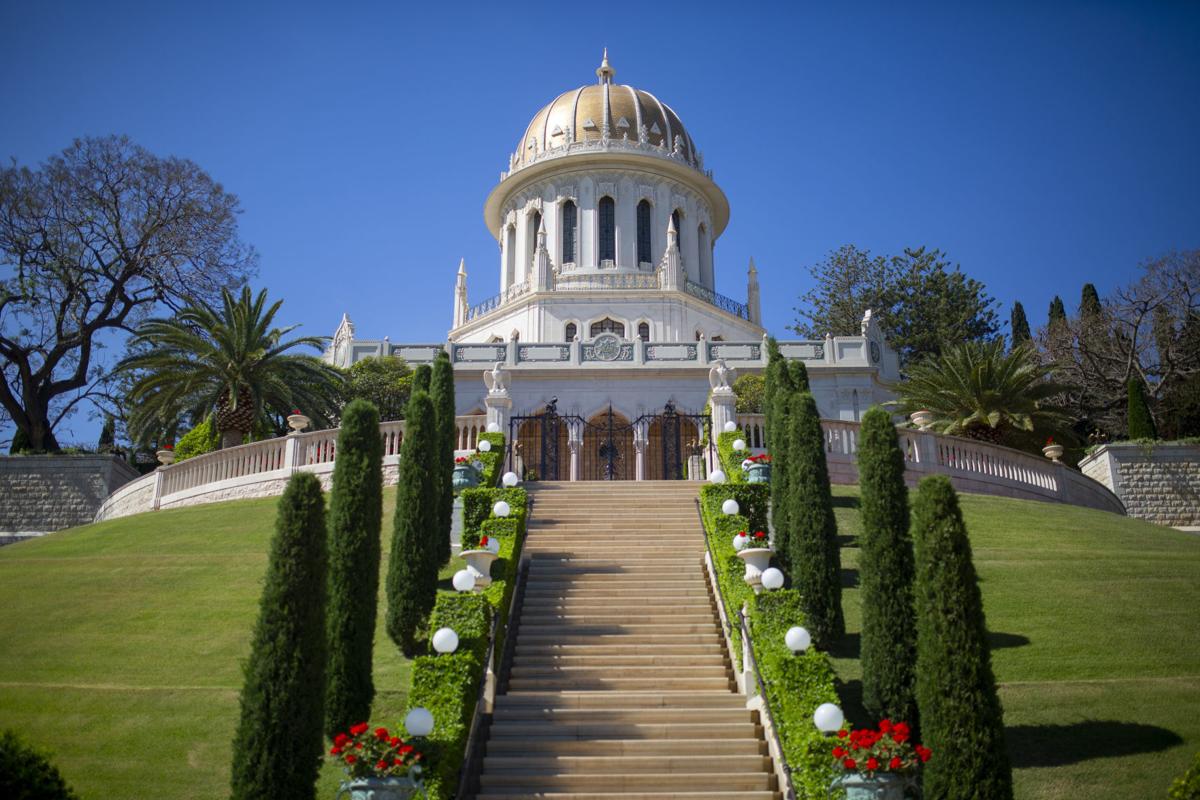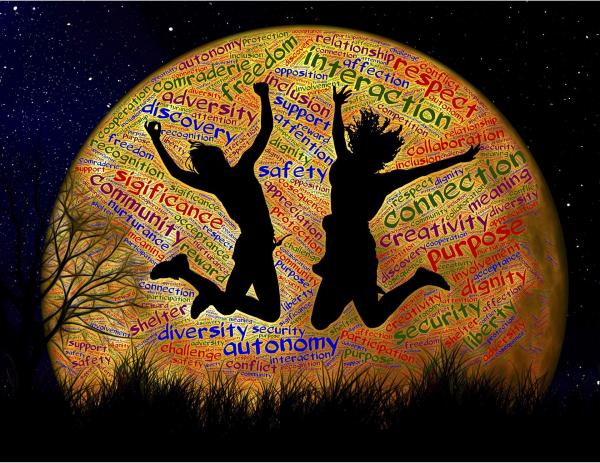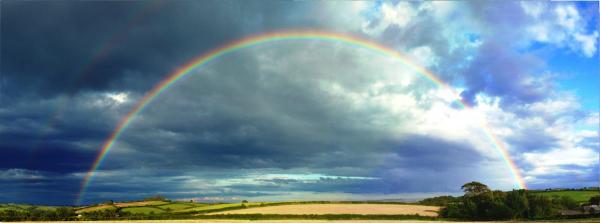
 Our age is one of spiritual hunger. We stay so busy earning the earthly bread, we forget the heavenly. A little girl moaned, “Mommy, I have a bad stomach-ache.” “That’s because your stomach is empty. You will feel better if you put something in it,” her mother assured her. An hour later a family friend who had come for a visit complained of a continuous headache. The little girl had a ready solution: “That’s because your head is empty,” she exclaimed, “You will feel better if you put something in it!”
Our age is one of spiritual hunger. We stay so busy earning the earthly bread, we forget the heavenly. A little girl moaned, “Mommy, I have a bad stomach-ache.” “That’s because your stomach is empty. You will feel better if you put something in it,” her mother assured her. An hour later a family friend who had come for a visit complained of a continuous headache. The little girl had a ready solution: “That’s because your head is empty,” she exclaimed, “You will feel better if you put something in it!”
We are so engaged in the race, we forget the goal. We spend little if any time to reflect, to seek knowledge, to search for a meaning to life. We look for quick and easy solutions that require no effort. One child said to the other, “I am lucky. My dad is a doctor, I can be sick for nothing!” The other said, “I am luckier. My dad is a pastor. I can be good for nothing!”
We often see happiness as a rising star in the twilight of the future. We rush through the hours and days of our lives with our eyes fixed to the ground to avoid the mud-holes, so that we keep a balance on life’s rough journey. The stress of coping and keeping up with daily demands leaves little time for spiritual fulfillment. Noted psychologist Eric Fromm declares that most of us die before we are fully born. A little girl was heard saying to her work-bound father, “Daddy, when you come home, could you please bring me a rat from the race?”
We devise attractive substitutes and distractions to quench the thirst of the spirit. But an “inner voice” keeps whispering that there must be more to living than working, saving, vacationing, retiring, and dying; that the dignity of being human deserves more, that it points to a more lasting purpose, to a more luminous horizon.
Therefore we assume that fulfillment must lie not at the beginning, but at the end of the rainbow. It will come later, when we make more money, meet a special person, buy an expensive toy, go on a cruise ship, or retire to an exotic island.
This book shows that there is no need to dream and wait for the future. As the renowned author and orator Dr. Leo Buscaglia declares, the future is now; the time to celebrate life is now; the time to love is now; the time to experience the wonders of being human is now; the time to grow is now; the time to choose the course of our destiny is now. The road to heaven and happiness is covered with gardens planted in due season; the road to grief and despair, with seeds planted too late.

This book invites you to take a break from the race, to pause and lift your gaze up and away from life’s mud-holes. It offers you a chance to experience the exhilaration of embracing and ascending the arch of a magnificent rainbow—a warm and heavenly embrace that will lift you and lead you to spiritual fulfillment—the heaven of inner peace and harmony.
You need not dream of an illusive star; a splendid light stands within the reach of your arm. You need not wait for the end of the rainbow; the heavenly arch is nearer to you than your own soul.
Once you start to make the transformational awakening journey, there is no going back. You develop a knowledge so powerful, you will wonder how you could have lived any other way.12
Your trust in God and in yourself as the instrument of His power and purpose determines the height to which you will ascend. Faith as little as a mustard seed can move a mountain; doubt as big as a mountain cannot move a mustard seed. As noted author and psychologist Dr. Wayne Dyer states:
Each person on this planet is inherently, intrinsically, capable of attaining “dizzying heights” of happiness and fulfillment. The main barrier to most people’s doing so seems to be fear—fear that the heights will make them dizzy…
There seems to be a widespread fear in our society of flying too close to the sun…When we look at humanity’s potentials for living in peace, harmony, productivity, even joy, and then look at the world as it is, the comparison is pathetic. And why has the human race gotten itself into this situation? For no other reason than that individuals have been blind to the limitlessness of their own potentials, and have spent their time striving to become average, to conform to what is traditionally expected of them, to fit into social structures that perpetuate the mess that much of the world is in.13
Many people spend all their lives on a wheel in a never ending journey of eating, drinking, sleeping, and working. They take little or no time for spiritual regeneration and renewal. What happens when a person loses sight of life’s purpose, when he reverses his priorities? Some young people exchanged the smaller front wheels of a mayor’s carriage with its back wheels. When the mayor went on a trip, he complained of the uphill road. And when he was told that the road is flat, he could not believe it. On his way back he discovered the reason for his uphill journey. That is what happens when we put our worldly desires ahead of our spiritual needs: Life becomes an uphill struggle.
Studies on the inner health of nations indicate that most people live in the dim twilight of life and death. In Thoreau’s words, they pursue “a life of quiet desperation.” They live as if they are cells, not souls, as if their goal is the dark solitude of the grave, and not the dazzling splendors of God. They investigate the mysteries of sub-atomic particles but ignore the marvels of their own self. As ‘Abdu’l-Bahá, the authorized Interpreter of the Bahá’í teachings, declares,
they prefer to study the resemblance between their own body and that of the ape, rather than to contemplate the glorious affiliation between their spirit and that of God.14
In the words of the comedian Will Rogers, “God made man a little lower than the angels, and he has been getting lower ever since.”
A Sunday school teacher proudly declared, “God made man in His wonderful image.” Dan, a six year old boy protested, “But, teacher, my dad is a scientist and he says our great great great parents were monkeys.” The teacher said, “Thank you Dan for sharing that information with us. But here we don’t talk about anyone’s genealogy.”
A state of spiritual apathy and complacency prevails throughout the planet. Many people prefer a life of dreaming to one of wakefulness, search, and adventure. Two friends were listening to a lecture. When they left, one said to the other, “Did you hear Jan’s snoring?” “Of course,” responded the other, “that was terrible. She did not let me sleep.”
Christ uttered the parable of the talents to portray the consequence of fearing to step out of one’s comfort zone, fearing to investigate new knowledge, fearing to learn, to grow and expand. Before going on a long journey, the Master (Christ) called his three servants and to each of them gave some capital to invest.
To one he gave five talents of money, to another two talents, and to another one talent, each according to his ability. Then he went on his journey. The man who had received the five talents went at once and put his money to work and gained five more. So also, the one with the two talents gained two more. But the man who had received the one talent went off, dug a hole in the ground and hid his master’s money.
After a long time the master of those servants returned and settled accounts with them. The man who had received the five talents brought the other five. ‘Master,’ he said, ‘you entrusted me with five talents. See, I have gained five more.’
His master replied, ‘Well done, good and faithful servant! You have been faithful with a few things; I will put you in charge of many things. Come and share your master’s happiness!’
The man with the two talents also came. ‘Master,’ he said, ‘you entrusted me with two talents; see, I have gained two more.’ His master replied, ‘Well done, good and faithful servant! You have been faithful with a few things; I will put you in charge of many things. Come and share your master’s happiness!’
Then the man who had received the one talent came. ‘Master,’ he said, ‘I…was afraid and went out and hid your talent in the ground. See, here is what belongs to you.’ His master replied, ‘You wicked, lazy servant!…you should have put my money on deposit with the bankers…’ _Matthew 25:15-27
What was the punishment meted out to the “one-talent,” fearful man who hid his talents? A perpetual life of despair, grief, and anger. Was that too harsh? Can a person be more unjust to himself and others than one who buries his marvelous talents for fear of the light? Manifesting one’s potential is the very purpose for which humans are made. Further, the punishment is always self-imposed. When someone hides from the splendors of the divine, he chooses to dwell in darkness, to descend to a life of quiet desperation, grief, and anger.
Theologian Alan Jones encourages each individual to investigate for himself firsthand the fundamental questions of life:
One of our problems is that very few of us have developed any distinctive personal life. Everything about us seems secondhand, even our emotions. In many cases we have to rely on secondhand information in order to function. I accept the word of a physician, a scientist, a farmer, on trust. I do not like to do this. I have to because they possess vital knowledge of living of which I am ignorant. Secondhand information concerning the state of my kidneys, the effects of cholesterol, and the raising of chickens, I can live with. But when it comes to questions of meaning, purpose, and death, secondhand information will not do. I cannot survive on a secondhand faith in a secondhand God. There has to be a personal word, a unique confrontation, If I am to come alive.15
As psychologist Dr. Robert Anthony notes:
Behind every success, or every seeming miracle of healing, there is a very simple cause—an idea…Ideas are the way out of those self-imposed limitations which can be a prison and a hell… That is why meditation is such an important part of successful living—it opens you to inspiration and understanding. When you meditate…you will never fail to receive ideas.16
Despair and cynicism have no place in human life. They are vacuums produced by the absence of knowledge. The following are clues for finding the gateway of heaven:
- From God’s perspective the world is perfect; we can see the perfection only through His telescope.
- A mind, like a parachute, does not work unless it is open.
- If we do what God asks, only the best can happen to us.
- The human mind is made for discovering and creating, not conforming.
- God does not close a door without opening a window.
- Only those who knock will find open doors. “Knocking” means praying sincerely and seeking knowledge constantly.
“Destiny is not a matter of chance, it is a matter of choice; it is not a thing to be waited for, it is a thing to be achieved.” Opportunity knocks only once in a great while, but complacency keeps knocking all the time. Noted psychiatrist Dr. Scott Peck invites us to a journey of perpetual search and an ever-expanding vision:
Most of us operate from a narrower frame of reference than that of which we are capable, failing to transcend the influence of our particular culture, our particular set of parents and our particular childhood experience…It is no wonder, then, that the world of humanity is so full of conflict…human beings, who must deal with each other, have vastly different views as to the nature of reality, yet each one believes his or her own view to be the correct one since it is based on the microcosm of personal experience. And to make matters worse, most of us are not even fully aware of our own world views…17
To develop a religion or world view that is realistic…we must constantly revise and extend our understanding to include new knowledge of the larger world. We must constantly enlarge our frame of reference.18
“We are all prisoners of our self-imposed limitations. We do not realize we have been in prison until we have broken out.” As former un Secretary Dag Hammerskjöld declared, “Never measure the height of a mountain until you have reached the top. Then you will see how low it is.” A teacher asked her students to go out and count the stars. Everyone came up with big numbers except a little girl who said, “I could see only one star.” When the teacher asked why, she responded, “Because my eyes are small.” Some people’s visions, like the little girl’s eyes, are too small to see the grand banquet of God.
Some of us keep our vision focused only on the visible. In a recent flood in California, a fifteen-year-old boy saw his beloved bicycle being swept away by fast-flowing torrents. In a desperate attempt to save his toy he lost his life. Most people are shocked by what happened. Yet without knowing, they follow the boy’s example. They exchange their whole life to accumulate toys they know they must leave behind. The difference is this: they do in a lifetime what the boy did in an instant.
Many people are so used to the dark, they cannot live in the light. A prisoner was set free after 22 years. Eight weeks later, he went to the judge and asked to be sent home. “Where is your home?” the judge asked. “Prison,” he replied. He had found himself outside his comfort zone. Freedom was his prison, prison his freedom.
In a famous trial recently broadcast in the United States, the judge instructed the jury in these words: “Be fair, be impartial. Judge in the light of reason.” That simple instruction can change the world into a place of peace and wonder. If followed, it can transform the dark of despair into the light of hope and fulfillment. As Bahá’u’lláh, the Founder of the Bahá’í Faith, declares:
The essence of all that We have revealed for thee is Justice, is for man to free himself from idle fancy and imitation, discern with the eye of oneness His glorious handiwork, and look into all things with a searching eye.19
Without knowing it, we are the juries of our own destiny. The judgments we make now determine if we will live in the prison of fear or in the paradise of freedom, in the dim twilight of illusions or in the luminous light of truth. This book is an attempt to reveal a glimpse of the life beyond the clouds.
Each one of us is a gift from God. How we treat this gift, how we polish and prepare it is our gift to Him. As sacred Scriptures teach,
we are God’s and unto Him shall we return.20
Will the gift be worthy of the Gift-Giver?
“There were two young men who thought they knew all the answers. They had been able to outsmart all the people in town and make a great deal of money, by fair means or foul. But there was a wise old woman who lived up on a hill, whom they simply could not outfox. One day one of the men said to the other: ‘We’re going to show the old woman that she doesn’t know everything, that she doesn’t have all the answers. We’ll go up on the hill, catch a bird, and ask her what we have in our hands, and she’ll answer, ‘It’s a bird.’ Then we will say, ‘If you are so wise, old woman, if you know everything, tell us, is the bird alive or is it dead?’ And if she answers, ‘The bird is alive,’ we’ll crush it in our hands and kill it. And if she answers, ‘The bird is dead,’ we’ll open our hands, and the bird will fly away.
“So the two know-it-all’s went up on the hill, caught a bird, and knocked on the old woman’s door. ‘Tell me, if you know everything,’ one of them said, ‘if you are so wise, what’s this I have in my hands?’ The old woman said, ‘Why, it’s a bird, my son.’ And the smart aleck said, ‘Then tell me, wise old woman, is the bird alive or dead?’ The old woman hesitated, and then, looking deep into the young man’s eyes, she replied, ‘It is all in your hands.’”
How regrettable indeed that man should debar himself from the fruits of the tree of wisdom while his days and hours pass away swiftly.21
Seize the time, therefore, ere the glory of the divine springtime hath spent itself…22 _Bahá’u’lláh
Only have faith, patience and courage—this is but the beginning…surely you will succeed, for God is with you.23 _ ‘Abdu’l-Bahá



